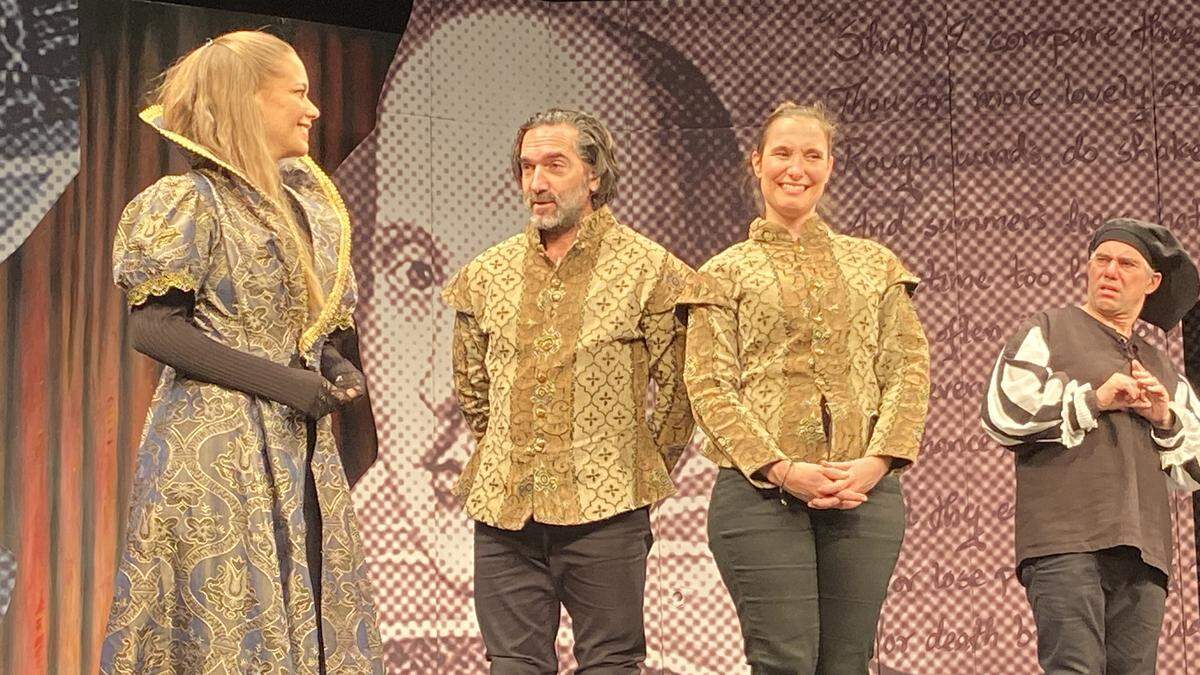Table of Contents
“Life in Shakespeare’s time is life-threatening!” – This is what the primary school teacher Rosa exclaims as she is suddenly catapulted from the present into the year 1594. There she awakens in the body of the poet William Shakespeare. And he is currently in a duel with the privateer Sir Francis Drake.
How could this happen? Rosa, plagued by lovesickness, was sent on a journey through time via hypnosis in the circus. Your task: to experience true love. She then ends up not only in time, but also in the body of William Shakespeare. The ensemble of the Braunschweig “Comedy at the Old Town Market” took on this original, twisted basic idea contained in David Safier’s bestseller “Suddenly Shakespeare” and turned it into an entertaining comedy that was shown on Saturday evening in the city’s house.
Over the course of the play, Rosa transforms from a stalker bathing in self-pity to a self-confident and strong female figure. Shakespeare, too, benefits from body sharing. Rosa meets him at the beginning of his career: He is 30 years old, still works as an actor in an acting troupe and sleeps in the theater. The great dramas such as “Hamlet”, “The Tempest”, “As You Like It” or “What You Want”, from which characters, quotes and storylines flow into the stage events, have not yet been written.
Also read:
Be careful of fake shops on the internet
Rosa recognizes that Shakespeare, who was actually described by his contemporaries at the time as an “upstart,” remains too surface-level in life and in his works. She advises him: “Let your wounded soul speak and you will become the greatest author of all time.”
A truly great ensemble thrilled the audience in the Düren Theater with a great feel for the comedic but also the quieter tones of the piece. Thomas Held had the greatest acting task that evening as the changing Shakespeare. He did them with amazing naturalness and ease, showed a great sense of timing and text nuances and impressed with great body control in the fight scenes.
Also read:
Is the Düren district itself to blame for being cut?
Daniela Michel played Rosa with great dedication, Jens Knospe made his characters, which included Rosa’s best friend Holgi and Shakespeare’s friend and fellow actor William Kempe, absolutely popular. Mia Geese jumped with somnambulistic confidence from role to role, including Queen Elizabeth and Countess Olivia from “What You Want”. Mathias Kopetzki impressed in the conqueror roles, for example as Sir Francis Drake.
The audience experienced an amusing evening at the theater and thanked them with long-lasting applause.
## World Today News Interview: “Suddenly Shakespeare”!
**Welcome to World Today News! Today, we’re joined by two esteemed guests to discuss the whimsical and thought-provoking new production “Suddenly Shakespeare,” which recently thrilled audiences at the Braunschweig “Comedy at the Old Town Market”.**
**Our guests are:**
* **Dr. Elizabeth Yates**, renowned Shakespearean scholar and author of several acclaimed books on Elizabethan theater.
* **Jonas Schmidt**, Drama Critic for The Daily Herald, known for his insightful and engaging reviews.
**Section 1: A Twist on History and Love**
**Emily (Host)**: Dr. Yates, “Suddenly Shakespeare” presents a truly unique twist, catapulted from David Safier’s bestseller. A modern woman transported back in time and inhabiting the body of the Bard himself. How does this unconventional premise contribute to our understanding of Shakespeare’s life and works?
**Dr. Yates**:
**(Respond to the question, drawing upon your expertise about Shakespeare and historical context)**
**Emily**: Jonas, what are your thoughts on the play’s depiction of love, particularly Rosa’s journey from “stalker bathing in self-pity” to a self-assured woman?
**Jonas**:
**(Offer critique of the portrayal of love and Rosa’s character development, referencing relevant examples from the play)**
**Section 2: Shakespeare Reimagined**
**Emily**: Dr. Yates, the play presents Shakespeare at an early stage in his career, before the masterpieces we know and love. How does “Suddenly Shakespeare” illuminate the development of his genius, and what might Rosa’s influence represent in this context?
**Dr. Yates**:
**(Discuss the early career influences on Shakespeare’s style, and offer insights into Rosa’s potential role in his artistic growth)**
**Emily**: Jonas, what struck you most about the play’s portrayal of Shakespeare’s “wounded soul”? How does this approach resonate with audiences familiar with his later tragedies?
**Jonas**:
**(Analyze the “wounded soul” concept, and connect it to the depth and complexity of Shakespeare’s later works)**
**Section 3: Theatrical Brilliance and Audience Impact**
**Emily**: Jonas, you mentioned the “truly great ensemble” in your review. Could you elaborate on what made their performance so captivating? Were there any specific acting highlights that stood out?
**Jonas**:
**(Highlight the strengths of the ensemble cast, mentioning specific actors and their contributions to the overall production)**
** Emily**: Dr. Yates, how do you think “Suddenly Shakespeare” speaks to a modern audience? Does it offer a fresh perspective on Shakespeare’s enduring legacy?
**Dr. Yates**:
**(Connect the play’s themes and story to contemporary relevance, emphasizing its ability to engage a modern audience with Shakespearean themes)**
**Emily**: Thank you both for sharing your illuminating insights on “Suddenly Shakespeare”. This fascinating production clearly offers audiences more than just entertainment - it provokes thought, sparks discussion, and invites us to revisit the timeless brilliance of Shakespeare in a refreshingly unexpected way.
**(Conclude the interview, thanking the guests and summarizing the key takeaways from the conversation.)**


